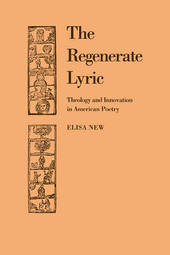
|
The Regenerate Lyric: Theology and Innovation in American Poetry
Paperback / softback
Main Details
| Title |
The Regenerate Lyric: Theology and Innovation in American Poetry
|
| Authors and Contributors |
By (author) Elisa New
|
| Series | Cambridge Studies in American Literature and Culture |
|---|
| Physical Properties |
| Format:Paperback / softback | | Pages:292 | | Dimensions(mm): Height 229,Width 152 |
|
| Category/Genre | Literary studies - poetry and poets |
|---|
| ISBN/Barcode |
9780521107310
|
| Classifications | Dewey:811.009382 |
|---|
| Audience | | Professional & Vocational | | Tertiary Education (US: College) | |
|---|
| Illustrations |
Worked examples or Exercises
|
|
Publishing Details |
| Publisher |
Cambridge University Press
|
| Imprint |
Cambridge University Press
|
| Publication Date |
2 April 2009 |
| Publication Country |
United Kingdom
|
Description
Elisa New presents a major revision of the accepted account of Emerson as the source of the American poetic tradition. New challenges the view that Emerson not only overthrew New England religious orthodoxy but founded a poetic tradition that fundamentally renounced that orthodoxy in favour of a secular, Romantic approach. She contends that Emerson's reinvention of the religion as a species of poetry is tested and found wanting by the very poetic innovators whom Emerson addressed and that a counter-tradition is evident in his major heirs - Whitman, Dickinson, Crane, Stevens, Frost and Lowell. Indeed, Emerson's own poetry failed in many ways to live up to his views and instead revealed an inherent paradox: that co-opting of religion by a poetic theory alienates religion from its life principle - theology - and disables the poem as well.
Reviews"...[a] superb first book...New's readings are rigorous and rewarding." Lee Oser, The New England Quarterly "The Regenerate Lyric makes the strongest case for the Puritan view since Pearce." Modern Philology "The Regenerate Lyric is an exciting debut. Well-read, and closely argued, it will be of interest for poets, critics, theologians, and historians alike." Matthew Cooperman, American Studies International
|